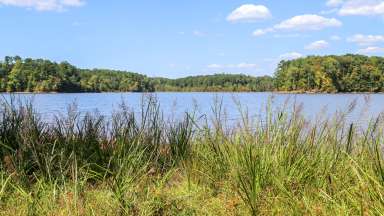The City of Raleigh values its parks, nature preserves, greenways, blue ways, lakes, and other natural areas. Our park staff are dedicated to minimizing impacts to these natural areas. You can help us preserve and protect natural areas based on the choices you make when visiting the parks. The City of Raleigh is a community partner with Leave No Trace, who has developed 7 principles, that you can use when visiting parks and other outdoor spaces. We hope you find this information helpful, and we look forward to seeing you in one of the parks.
The Seven Principles
- Plan Ahead and Prepare
- Travel and Camp on Durable Surfaces
- Dispose of Waste Properly
- Leave What You Find
- Minimize Camp Fire Impacts
- Respect Wildlife
- Be Considerate of Others
Plan Ahead and Prepare
Adequate trip planning and preparation helps park visitors accomplish trip goals safely and enjoyably, while simultaneously minimizing damage to the land. Poor planning often results in unsatisfied park visitors and damage to natural and cultural resources. Some examples of items to consider, research, and prepare for before your outing are:
- Regulations and Permits
- Operating Hours
- The Weather Forecast
- Trail or Seasonal Facility Closures
- Trail Maps and Descriptions
- Your Group Members’ Skills or Fitness Levels
- Water Sources and Bathroom Locations
Knowing these items ahead of time will allow you to make the best choice for your group and minimize impacts to the natural environment.
Travel and Camp on Durable Surfaces
Travel in the outdoors is all about the setting and being surrounded by the natural environment. The goal is to move through natural areas while avoiding damage to the land or waterways. Understanding how travel causes impacts is necessary to accomplish this goal. Travel damage occurs when surface vegetation or communities of organisms are trampled beyond recovery. The resulting barren area leads to soil erosion and the development of undesirable trails. Some basic points for Traveling and Camping on Durable Surfaces are:
- Stay on Established Trails. Avoid Non-designated Trails and Cut Throughs as These Trails Damage Surrounding Resources.
- Walk, Hike, or Bike on Dry Trails. Water is a Key Factor in Erosion.
- Camp at Established Campsites. Established Campsites are Designated Areas Where use and Impacts are Focused.
Dispose of Waste Properly
You may have already heard the phrase, “Leave it better than you found it.” Enjoying a natural setting goes hand in hand with keeping nature beautiful. Removing waste reduces environmental impacts as well as psychological impacts on other users. Here are a few ways you can act:
- Use Reusable Water Bottles, and Utensils.
- Pack out Trash and Litter.
- Use Pet Waste Bags.
- Utilize the Bathroom Facilities Before Traveling on Trails. Avoid Using the Bathroom in a Natural Setting.
Leave What You Find
Allow others to have the best first impression of a park or natural setting by leaving rocks, plants, and other objects as you found them. The best way to summarize this is:
- Take only Pictures,
- Leave only Memories.
Minimize Campfire Impacts
Fires can be a great thing. They can provide warmth, a way to cook food, and light during the night. Uncontrolled fires can also be a bad thing. Wildfires can destroy property, native plants, and eliminate habitat for animals. Proper use of fire helps minimize its impacts and reduces wildfires. You can make a difference by deciding to:
- Follow Park Regulations Fire, and Fuel Types
- Don’t Have or Make Fires Outside of Established Fire Rings or Grills
- Make Sure Your Fire is “Dead Out” Before Leaving the Area
Respect Wildlife
Parks are home to many different types of wildlife including, Birds, Fish, Reptiles, Amphibians, as well as Large and Small Mammals. Respecting wildlife can look like a lot of different things, but some basics include:
- Give Wildlife Space. Don’t get close to them trying to touch or take pictures.
- Do Not Feed Wildlife.
- Never Chase or Scare Animals Causing them to Enter Fight or Flight Mode.
Be Considerate of Others
Raleigh is a big City with many different people. Each person looks to the parks for a place relax or recreate. Chances are when you are in the park you will encounter other people. Here are some best practices to reduce your impact on others and their experiences:
- Follow Trail Use Guidelines. This Includes Right of Way, Speed, and Communication or Signaling.
- Keep Your Pet Leashed, and Near You
- Pick Up After Your Pet and Dispose of Waste Properly
- Minimize Noise in Natural Settings
The implementation of the 7 Leave No Trace principles can vary from activity to activity and from ecosystem to ecosystem. To learn more about how to best implement minim impact practices or more on outdoor ethics sign up for a program with the City of Raleigh on Rec-link and visit the websites below.
The 7 Principles - Leave No Trace Center for Outdoor Ethics (lnt.org)
